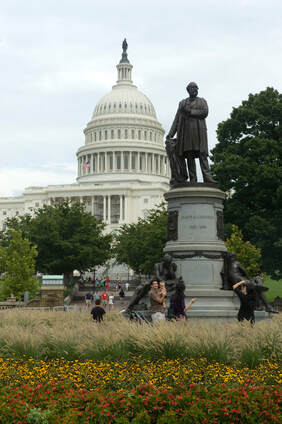 So here we are. Enter “46.” A significant percentage of our nation is jubilant, euphoric and full of hope. A significant percentage of our nation is anxious, resigned and full of dread. A significant percentage - perhaps - also settles in somewhere in-between those well-publicized extremes. The victors call for unity, as victors tend to do. Others wonder where that unity was when “45” prevailed and they were the victors. The question of unity - what that really means, and what is reasonable to expect when invoking that call, looms as a crucial question with no easy answers. Fittingly, the first dictionary entry I glimpsed defined it using a political example: “U·ni·ty | ˈyo͞onədē: The state of being united or joined as a whole: ‘European unity; their leaders called for unity between opposing factions.’” “Unity between opposing factions.” If that isn’t one of America’s most pressing problems, I don’t know what is. Given our apparent current level of division, which seems to be approaching that of the Civil War era, it’s valid to question whether that’s still achievable to any meaningful degree. As was evidenced by deadly riots and numerous other conflicts in recent months, the cost of extreme disunity is high in the short term, and potentially much higher in the long term. In an 1838 speech, Abraham Lincoln spoke to the belief that, for America to collapse, it would have to be an inside job: “At what point, then, is the approach of danger to be expected?,” asked Honest Abe. “I answer, if it ever reach us, it must spring up amongst us. It cannot come from abroad. If destruction be our lot, we must ourselves be its author and finisher.” And some 20+ years after he said that, it very nearly came true - on his watch. I tend to agree with “16”’s warning, with the caveat that America’s numerous sworn external enemies around the globe are watching closely for widening cracks in a national unity which for so many years gave us at least the appearance of invulnerability. They are anxious to widen those cracks by any means available to them - and eventually to step right through them. That’s the sort of realistic threat which should provoke greater national unity. However, despite that clear and present danger, it’s hard to see that happening any time soon, isn’t it? The main obstacle to functional unity seems to be competing ideologies which have never been more disparate than they are right now. The popular counter to that is presenting ‘tolerance’ as a high and mandatory virtue. However, finding an acceptable marriage between ‘tolerance’ and compromising one’s closely-held core beliefs is elusive at best, and often impossible. While I am in the group resigned to our nation now drifting in what I feel is an unwise direction, I take much greater solace in God’s sovereignty: “For in him all things were created: things in heaven and on earth, visible and invisible, whether thrones or powers or rulers or authorities; all things have been created through him and for him.” - Colossians 1:16. That ultimate reality allows me to live with hope and to sleep well. For me personally, I will genuinely pray for the new regime in the White House and Congress, even though I find myself at odds with many of their stated objectives; pray that they are led to making wise and just decisions that would be good for our nation and acceptable to God, not just convenient to humanity or popular with constituents. Second only to God & family, I love the nation of my birth. I am not ashamed of her, nor embarrassed by her…and I will pray for her, too - in this, her hour of need. Revisiting the idea of achieving unity, perhaps collective prayer is the only vehicle that can truly drive us there. In fact, I’m convinced it is our only real hope.
0 Comments
I seriously doubt actual call center employees ever really look this happy... So I’m some months into my first working experience in the inbound call center world -albeit working from home.
While trying to answer random callers’ questions about obtaining government loans and grants is certainly not a role to which I’ve ever aspired, in our present circumstances, I’m truly thankful for the work, and it can be rewarding on those occasions when I genuinely feel as if I’ve helped someone. However, I quickly discovered that this gig can be majorly frustrating as well. Beyond being cursed out by callers, dealing with likely fraudsters, IT issues and the like, it’s actually the rules of the call center world itself that I find the most trying. The greatest of those frustrations centers on the fact that what I consider trying my best to help people and what those who evaluate us consider a top effort aren’t likely to be the same thing. I certainly understand that they need metrics of some sort, and that perceived efficiency (i.e. the highest possible number of short calls) is chief among those. Where that model seems to fall short, however, is primarily measuring what we do with a counter and a timer. We’re under considerable pressure to complete as many calls as possible, as quickly as possible, and to also make our mandatory after-call notes in less than 60 seconds in order to be available for the next call. While there’s admittedly some necessity to handling calls and post-call work efficiently, it seems to me the number one goal in anything labeled ‘customer service’ should be exactly that - and that’s not something best measured with a stop watch and a calculator. Actually helping a caller reminds me more of my time as an EMT, where I found that patience and empathy often proved at least as important as vitals and drugs. Something the nature of a government loan is complicated enough for me, even with specialized training. It has to be very daunting indeed for many of the callers with whom I speak. On top of that, we’re at the mercy of: Folks with a poor command of the English language, poor-quality connections (Pro Tip: Calling about an important financial matter from your noisy car on speaker phone is not in your best interests…), ill-prepared callers who spend the first few minutes just fumbling for their application number or other basic information, or callers who seem to be spoiling for a fight right from the word ‘Hello.’ Those are all things that lengthen calls which we can do little or nothing about. Evaluators do occasionally listen in on calls, and occasionally callers provide their own positive or negative feedback, but the vast majority of the time, it’s just about time on the line, regardless of what actually transpired on any given call. Nothing to be done about it, really. Nature of the beast. It’s also quite possible that more savvy and experienced call-takers view things differently. I’m just a newbie calling it as I see it so far. End of rant. Thanks for calling…err, listening. 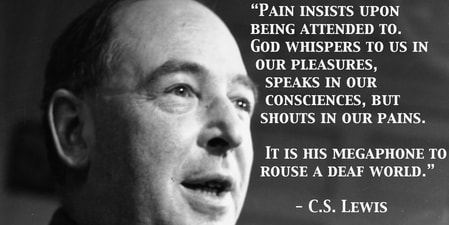 Please forgive my starting this by invoking an old crude saying, but I beg your indulgence: “Opinions are like a**holes - everybody’s got one.” Likewise with 2020 stories - everybody’s got one - and mine involves almost not having an a**hole. That’ll take a bit of sometimes-icky explaining, but if you’re game, so am I... First, though, let’s set the Wayback Machine to where most folks’ 2020 stories begin - around March, when all of our lives seemed to start morphing into something strange and unpleasant. I was just getting immersed in my usual spring sports photography, along with some other freelance gigs, when that stream suddenly dried up. Our family experience from there rings similar to many others. My wife’s downtown government office was shuttered and she began working from home - an arrangement that took some technological adjustment and furniture re-arranging. Our son’s freshman year of college in Virginia came to a screeching halt and so we retrieved him in two university-regulated trips - one for him, the second for his dorm stuff. He’s made the best of it, although the reality is that while online studies aren’t ideal for any student, some majors are more disrupted by that format than others. Music majors spend much time in crucial small- and large-ensemble rehearsals and performances, plus nuanced private lessons. Theirs is a pursuit majorly up against it in the new COVID campus reality. In an ironic footnote - a painful one for our son - he was scheduled to be part of a spring music department trip to…China. The itinerary included Wuhan, which, until 2020, was perhaps better known (at least in percussion circles) as the namesake home of cymbal production. Wuhan will now be forever known for producing something else entirely. At first, organizers postponed the trip, but as you’d expect, they eventually had to give up. Disappointing, but infinitely better than whatever might’ve transpired if they’d gotten over there and then the pandemic had broken out. Scary thought there. Our daughter’s grad school situation in Syracuse was, thankfully, not quite as complicated, since she was able to ride it out and finish her semester from her off-campus apartment. It did scrap her plans for some summer project work, but in the grand scheme of COVID casualties, that’s admittedly small potatoes. So once the initial adjustments were made, school years ended, summer came and we - like most of America - did our best to settle into the bizarre new routine of living the reclusive American COVID life. Even managed to escape to the Adirondacks for our annual camping trip, though we spent more of it than usual staying at our campsite. To this point, we were - also like most of America - mostly just thankful to be free of the invisible killer. OK - time for the a**hole part. During all of this I had, for some months, been struggling with an intestinal issue. Sadly, this is not new for me, as I have often struggled with such things through my adult life. I was diagnosed with ulcerative colitis (UC) in early adulthood. Although doctors, drugs and diets were eventually able to give me some decent control over it, it did, especially in the early going, cost me jobs, relationships, self-confidence and more. My first personal ’thorn in the flesh,’ if you will. However, this newer issue I’d been unable to corral just felt and acted differently than my familiar foe. It turned out to be a newer, sharper thorn known as clostridium difficile. “C-diff” is an aptly-named bacterial infection that is harder to get rid of than a well-bankrolled incumbent. In my case, it was caused by an antibiotic I’d been prescribed for an ear infection by an urgent care doctor who was apparently unaware of the risk that particular antibiotic presented to an intestinally-challenged patient such as myself. (Cautionary tale there...) Ironically, the treatment for this antibiotic-induced issue is…more antibiotics. They tried all three of the recognized possibilities - one of which costs $2,000...per pill. That’s enough to tighten anyone’s sphincter. (Thankfully, it was covered by a small co-pay, but I did briefly plot to trade them on the black market for camera gear…) Unfortunately, the pricey pills and the less-pricey pills were equally ineffective. Doctors finally tried a last-ditch procedure known as an FMT - a fecal matter transplant. (I know I’ve ventured deep into TMI territory here, but heck, you’ve come this far…) Well, the FMT did the trick almost overnight. Unfortunately, months had lapsed leading up to that point, and the havoc the C-diff had wrought on my already Swiss-cheese colon was considerable. With my lengthy UC history, I was already on a scheduled annual or biennial colonoscopy schedule since my 30s. I’ve tried every prep, every anesthesia, and have outlasted the retirements of two gastroenterologists. So…on the last day of July, my current GI decided to have a look-see to make sure things were healing up from the C-diff episode. That’s when he found what turned out to be the biggest thorn of all: A tumor. Thankfully, it appeared to be relatively small and not far along, but still, quite a jolt when he clued me in after the procedure. My paternal grandmother died of colon cancer. Well, from there came a surgical consult with a doctor based out of Strong Memorial in Rochester and the discussion of different options - none of them particularly pleasant. My least favorite involved losing the entire colon and a permanent ostomy - a hole in your side where a bag goes to collect waste in lieu of the normal exit strategy. In that one, they sew your now non-functional a**hole shut. So there ya’ have it: I would’ve been effectively sans a**hole. Moving on. There was a second option involving a temporary ostomy while they surgically turn part of your small intestine into a faux colon, let it heal and then close up the ostomy. Solid choice for some, but can’t say I was enthused due to several potential complications. Thankfully, there emerged a third possibility in my case - a no-ostomy option where they remove most - but not all - of the colon and just connect it to the small intestine. Surgeons and plumbers have more in common than steep hourly rates. Two months to the date after my jolt of reality - and a couple of weeks after I’’d begun a decent new work-from-home job - came the first major surgery I’d ever undergone. Took over seven hours (so they tell me) and took me another eight days to finally make it home, due to some rather unpleasant post-surgical complications which I’ll spare you. That slow recovery continued on at home for weeks. Major abdominal surgery is that much more major when you’re older (I “celebrated” my 60th birthday a couple of weeks after the surgery. ’Twas a memorable birthday, anyway…) The other big thing with cancer surgery is what does/doesn’t transpire afterwards. Thankfully, the pathology showed a Stage 2 situation which, in my case, made any follow-up chemotherapy optional and of the variety that you can do in pill form at home. Debated that decision quite a bit, and ultimately tried to give it a go, even though the statistical impact on any possible recurrence only dropped a handful of percentage points with a six-month course. However, it ultimately didn’t work out due to some suspected side-effects encountered a few days after I’d started. Now I wish I could just wrap up the story neatly right there and say “All is well again!” - but how often does real life actually work out that way? Not so much. As I was finally recovering from all of that, a new thorn sprang up - this one a different, but not unfamiliar pain: Gallstones. I’d had a couple of gallstone attacks over the years, although none recently. Not quite as unpleasant as a kidney stone attack (I’ve had those, too - still the worst pain I’ve ever experienced), but miserable enough on their own. Those prior attacks went away of their own accord, as is often the case. Not this one. Eventually, I had to concede that the only reasonable option was the one I absolutely loathed the thought of: Going back into a hospital. And so came to be my second major abdominal surgery in the space of 11 weeks. One more significant internal organ bites the dust. Getting rather roomy in there. On the bright side, my stay there was only three days, allowing me to sneak back home in time for Christmas. Recovery has been a bit slow, particularly for my poor abdominal wall, which has been more pierced lately than a tattoo parlor addict. Also got a taste of just how sharp the CO2-induced shoulder pain of laparoscopic surgery can be. So now, here I sit writing this as 2021 approaches the station, and COVID and all of its issues couldn’t be further from my mind. No, for me, the significant challenges of 2020 have been highly personal. That dynamic will likely stay in place for me as well. Cancer surgery is the gift that keeps on giving, with periodic monitoring for the rest of your days - each test being a potential ticket to more and greater misery. However, I can honestly say that I’ll endeavor to enter this new year not bitter, nor scared, but rather in a very thankful frame of mind. As a Christian man who has experienced a few things in my 60+ years, one firm principal I’ve experienced repeatedly is that God teaches us the most important and indelible lessons during the depths of our greatest miseries. He definitely grabbed me by the lapels the last few months, and shook hard. That’s not the sort of treatment we usually appreciate - at least not at the time it’s happening. Yet as I (hopefully) begin to emerge from the ashes of my personal version of 2020, I do so with a thankful heart. I know one popular - and well-intentioned - take would be that I’m some sort of ‘overcomer’…that I toughed it out and somehow prevailed over challenging circumstances on my own inner strength. The ‘You Got This’ concept. Another would be that I simply benefited from the triumphs of modern medicine and that neither I or any deity had anything whatsoever to do with it. The ‘Because...Science!” crowd. Apologies to both camps, but I know better. I’m sitting here writing this solely because of the grace of God…a grace which provided the medical marvels involved...which provided me - day-by-day and sometimes minute-by-minute - with the strength needed to just make it through another day, another procedure, another thorn. Of course, I’m not privy to what future thorns may await. None of us are. However, I am secure in the belief - strengthened considerably over the past few months - that my God will be right there to walk me through it, safely to the other side. That’s a fact, not just opinion...because, after all, everybody’s got one of those. I’M 60 YEARS OLD. With one or two possible exceptions during the foolishness of youth, I’ve voted annually since I was eligible to do so (and personally, I’ve never felt the need for a ‘participation sticker’ to brag about fulfilling my personal civic responsibility, but if it makes you happy, that’s cool...) I was an independent for most of my adult life, until I got tired of being completely shut out of the primary process here in the good ol’ Empire State. (Did you know that almost half of states allow some form of open primary voting?) So I picked the party that aligned most closely with my conservative, traditional values.
The first time I voted in a presidential election was 1980 - Carter vs Reagan. In that pairing, there was at least a semblance of character and ideals from which to choose. I’m pretty sure I voted for Carter, but didn’t feel any great sense of dread when he lost. Back then, kids, you could at least have some sense that either candidate would still try to work with Congress towards the nation’s best interests, even if they viewed those priorities and the paths to them rather differently. I’ve been voting long enough to realize that this election, like most every other, isn’t really about who’s the most glib orator (a.k.a. the most “presidential.”) No, it’s about policies, track records and the ideals and priorities expressed in their party platforms. On that basis, there’s a veritable canyon between the two main choices, with a striking lack of middle ground to stand on. Never in our history has “left” been so far left, nor “right” so far right. Speaking of which, I also believe that running mates matter. Enough so that, in 2008, I - with significant reluctance - voted for Barack Obama, because the thought of a clearly ill-equipped Sarah Palin being a missed heartbeat away from the White House was too much to overlook. In 2020, the prospect of Kamala Harris - the veritable face of today’s far “left” - being a missed heartbeat (or a mental competency test) away from the White House, amounts to a reverse replay of the Palin conundrum for me. My sincere concern is that America would suffer irreparable damage having the left wing in the West Wing. It has absolutely zilch to do with her gender, race, or ‘white privilege.’ I judge her the same as I do any would-be leader of mine: On track record and stated goals. Suffice to say, we see the world - and America’s role in it - much differently. Same applies to Biden, of course. From government-mandated abortion policies and nonsensical gender laws to the heavily-flawed “Equality Act” and “New Green Deal,” there’s just precious little common ground I can find there. Popular culture would label me as some fringe pariah for not supporting those major planks of DNC policy. Were that true, then so be it, but honestly, I don’t buy it. While I have no idea who might prevail in this election, I attribute the closeness of it more to a continuing repudiation of liberal policies which aren’t nearly so popular as their supporters would have us believe. Meanwhile, as Election Day heads to a close, cities are putting police & fire on alert and barricading vulnerable places in anticipation of prolonged rioting - the sort of violence that too many leaders - mostly Democrats - were hesitant to combat or even speak out against in recent months. I hope for all of our sakes that wiser leadership prevails should we face that same nightmare again - or worse. All of that said, my biggest hope and prayer is simply for a peaceful process. I view life through the lens of scripture whenever possible. That means you won’t hear me utter such foolishness as “not my president.” While there are policies I cannot support and will fight against, if Joe Biden is elected, then he’s my president and I’ll pray for him. Ditto Donald Trump. “Let every person be subject to the governing authorities. For there is no authority except from God, and those that exist have been instituted by God.” - Romans 13:1. That can be a very tough passage of scripture to follow, but contrary to popular opinion, the Bible has never been a pick-and-choose proposition. Yes, there are points where defying government is valid, such as when its edicts run contrary to God’s word. That’s a scenario that requires biblical knowledge and wise, prayerful discernment. Thankfully, as a Christian, His word also provides a trustworthy and merciful limit on any anxiety or despondency I might be tempted to feel if I feel my government is headed in the wrong direction: “For by Him all things were created, in heaven and on earth, visible and invisible, whether thrones or dominions or rulers or authorities—all things were created through Him and for Him. And He is before all things, and in Him all things hold together.” - Colossians 1:16-17. Amen to that. 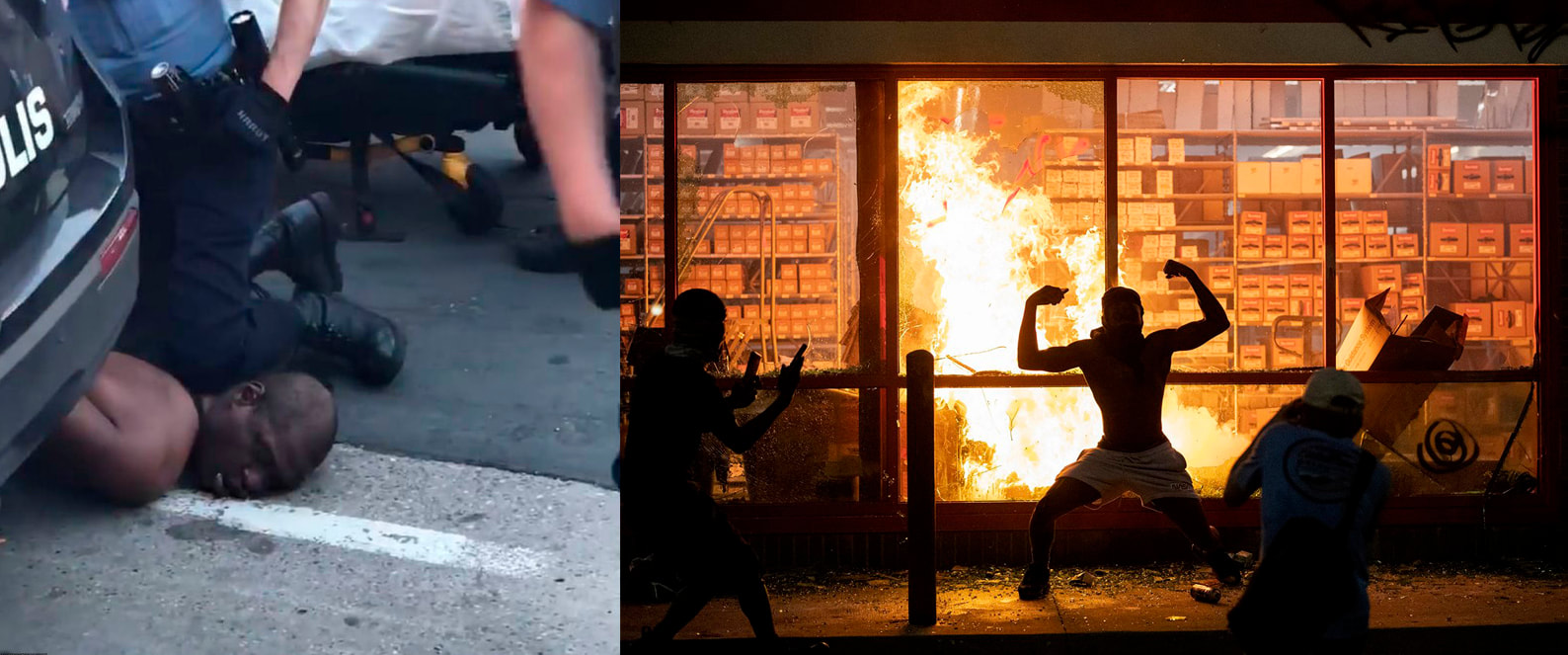 So here we are…again. A black man has been killed by a white cop. The video evidence seems damning and what seems to be a cop of the worst kind has been charged with murder. While as a rule we need to be wary of rushing to judgement based on a single video, it’s hard to image any extenuating circumstances in this case. Three more officers who apparently did nothing to stop it should face equally serious charges as well. Unjustified killing, plain & simple, regardless of what the victim may have done to warrant police attention in the first place. Meanwhile, sections of a major American city were predictably torched, stores looted, vehicles destroyed, a police station burned, and countless residents and business owners, along with the city’s fire and EMS personnel put in potentially deadly situations as a result of the mob’s actions. Just as predictably, video showed looters - masked not because of COVID-19, but to hide their faces from security cameras - gleefully exiting stores with whatever they could carry, ostensibly in the name of some sense of justice or revenge, but more likely opportunism and greed. There’s no way to justify what now former police officer Derek Chauvin did to George Floyd. None. When someone entrusted with the sacred duty of a cop betrays that trust, it does nothing less than kill off a piece of America. Legitimate law enforcement - along with free and verifiably honest elections - are among the most crucial lynchpins to the continued survival of our republic. I admittedly took those for granted growing up in suburbia, but I no longer do. Undermine those and we truly are on the verge of descending into an abyss from which we are unlikely to escape intact. However, there’s also no legitimate way to justify the burning and pillaging of Minneapolis in the process. It does nothing but cheapen and sully the legitimate concerns of many citizens there, black or otherwise. It also inarguably subjects so many people to life-threatening danger and other lasting hardships. What good purpose does that ultimately accomplish? None whatsoever. Law enforcement: We desperately need you to purge your ranks of prejudice and dishonesty wherever you may find it. Turning a blind eye or a deaf ear makes you an equally guilty accomplice. Out of necessity, you’re held to a higher standard. We all need your courage...your honesty...and your compassion. Desperately. Community leaders: We need your leadership. Fight however you are able to restrain the rioting and violence that serves no one but those who look for an opportunity to stoop to it. Even a man’s tragic murder doesn’t justify more evil. Let’s be crystal clear: Racism is a sin without moral justification. Anyone who espouses it from a shell of Christianity is a deluded liar. I pray for calm, reason and reform. I pray for justice...for all.  Things being what they are, the demand for my professional services hasn’t exactly been overwhelming in recent months, as opposed to our bills, which continue to be impressively overwhelming. With that in mind, I took a part-time “essential services” job as a cashier with a local grocery store. After decades on the consumer side, this is my first foray to the other side of the conveyor belt, and it’s been an eye-opener in many ways. To wit: I offer up this bagful (“Is plastic OK?”) of random retail ramblings accumulated over the past month: * First off, grocery cashier is a stressful job, mentally and physically demanding in ways you might not have imagined unless you’ve done it. First off, just standing in place that long (six hours with one 20-minute break in the middle, for example) is taxing by itself, particularly if you’re not a high school kid as many of my fellow cashiers seem to be. Meanwhile, you’re getting a steady and often non-ergonomic upper-body workout, grabbing, scanning, bagging and hefting…over and over and over through a seemingly infinite ribbon of groceries. (Pro tip: If you’re one of those mega-buyers of pop or other heavy items, please, oh please leave ‘em in the cart and let me scan them there. Saves everyone time and defers my hip and shoulder replacements a little while longer. And a special place in heaven is reserved for those kind souls who make sure the UPCs aren’t buried.) Then there’s the mental stress. While most customers are actually pretty nice, some…aren’t so nice. (I know standing in this line probably isn’t your favorite part of the day. It’s not mine, either.) Beyond that, getting you checked out fast and without crushing your eggs or bread requires a constant series of near-instantaneous packing decisions. As your order starts flowing toward me, I’ve already, out of necessity, paired up at least two bags worth of stuff in my mind. And the mind-numbing hits just keep on a-comin’, hour after hour. So to summarize, just sayin’: Please have a heart, we’re doing our minimum wage best for you and it’s not as easy as we may sometimes make it look. * Doing all of the above while breathing through my mask for six hours just makes it that much more fun. Trying to understand what you’re telling me through your mask amid the din of grocery store background noise makes it even funner! * Ya’all are eating and drinking WAY too much junk. Seriously. Quarantine or not: Just because you can get a deal if you buy a half-dozen six-packs of pop doesn’t mean you should. There are some good healthy eaters out there, for sure, but the majority seem to be sucking down pop, beer, chips and other crap at an alarming rate. I’m in no way claiming sainthood there, but yikes! * Paper bags inside plastic bags is a match made somewhere other than heaven. I get that you want maximum structural integrity, but paper grocery bags fit inside plastic bags like Jackie Gleason putting on Cher’s pants. Average age of shoppers requesting this awkward combo: 72. * Please use the order dividers. I’m busy enough without having to try to divine where your order ends and the next one begins. * I’ve had an affinity for coins ever since I got into collecting them as a youngster. That said, dealing with change in general - and pennies in particular - is a cashier PITA. Much as anything, it’s the inevitably awkward handoff. Any change permutation ending in “4” or “9” pretty much blows. *Oddity: Complete strangers addressing me by my first name, by virtue of the name tag I forget I'm wearing. Still catches me by surprise. I just want to respond, "Hey Bob! How's it goin'?" “That is all. Thank you for visiting Register 13, and have a great day!” 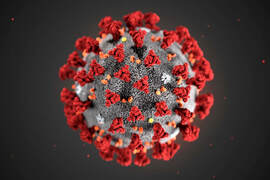 “…Watch out that you are not deceived. For many will come in my name, claiming, ‘I am he,’ and, ‘The time is near.’ Do not follow them. When you hear of wars and uprisings, do not be frightened. These things must happen first, but the end will not come right away. Then he said to them: “Nation will rise against nation, and kingdom against kingdom. There will be great earthquakes, famines and pestilences in various places, and fearful events and great signs from heaven.” - Luke 21:8-11 While I believe with all my heart that Jesus’ words are true and will come to pass, I make no pretense of knowing whether our current global pestilence – COVID-19 – is specifically part of what He foretold. I don’t believe it’s a sign of any imminent prophetic event. However, this verse, as well as a similar one in Matthew 24, do seem to clearly indicate that we should expect such prophetic signs to increase in frequency and intensity as Christ’s return nears. So at the very least, it seem plausible – if not likely – that God is allowing this in order to get our attention, and there’s no arguing that COVID-19 has our collective attention like nothing else in recent history. As I limp toward my sixtieth year, never have I witnessed first-hand a singular event that has simultaneously shaken the everyday lives of the entire globe. Perhaps WWII came close. It’s also true that history provides plenty of similar examples of plague and pestilence which have recorded exponentially higher death tolls; the 14th century’s “Black Death” plague took a minimum of 75 million lives, so one might argue that COVID-19 is but a comparative minor blip on the grand timeline. However, viewed from both a historical and a biblical perspective, that seems doubtful. Historically, reaching back to the ‘Spanish Flu’ epidemic early in the last century, while healthcare knowledge and resources were relatively poor and great loss of life was widespread, implications beyond that proved generally manageable and relatively short-lived. But in the world of 2020, it seems indisputable that the implications of COVID-19 are much more far-reaching. Despite major improvements in medical technology, ours is a world connected much differently and more intimately than that of a century ago; we’ve never been so interdependent and, as such, never as prone to the catastrophic effects now being experienced on a global basis. We’ve only just begun to digest the short-, mid- and long-term implications. Meantime, while I claim no formal theological training, a basic grasp of prophecy makes it clear that the time in which we now live is markedly different from days gone by. Even a layman knows that prophetic events follow a roadmap with key milestones, not all of which have readily discernible timing. However, there seems to be general consensus among experts that the most recent definitive event occurred with the reconstitution of the State of Israel in 1948. Once that happened, most of those experts believe, it was ‘game on’ for end times prophetic events to begin unfolding, albeit with an undefined timeline for now. In fact, the next event anticipated by many believers is the ‘rapture’ – the sudden removal of all believing Christians – without warning. One can debate whether the prophetic signs outlined in the Bible - wars, rumors of wars, earthquakes, famines, plagues of locusts and pestilences (all of which are with us today) - are increasing at an alarming rate. Secular science and humanism would claim a logical physical explanation for each of those. However, viewed collectively, do those explanations remain plausible? It’s an important question each of us needs to ask - and answer - for ourselves. Over the centuries, so many have tried to dismiss scripture - and prophecy in particular - as fanciful mythology or mere symbolism. Time and time again, however, the historical and archeological record has shown otherwise. In court, it’s called a preponderance of the evidence, and an honest weighing of the evidence for biblical reliability makes a strong case indeed - much stronger than those who would write off our past, present and future to cosmic chance and random evolution. As for COVID-19 itself, a prominent pastor recently outlined what I thought were six critical points highlighted by this pandemic. They are: - The vulnerability of everyone - The credibility of the bible - The uncertainty of life - The scarcity of hope - The sufficiency of Jesus - The urgency of salvation It’s irrational to argue against the first point. In a matter of weeks, this virus has killed over 100,000 people and fundamentally altered everyone’s modern-day life right down to the most basic components, from a simple hug or handshake to a grocery shopping trip or social activity. COVID-19 has killed young and old, healthy and infirm. Our universal vulnerability has been laid bare for all to see. The credibility of the bible has already been addressed. If you have personal doubts remaining, you owe it to yourself to explore them and give your questions the thorough consideration they demand. Dismissing out of hand its already fulfilled predictions and admonitions seems unwise. If there’s any silver lining to the cloud now hanging over our world, it may well be that COVID-19 has, with the clarity of a giant church bell, reminded all of us of the fragility and uncertainty of life. Whenever I see a pro athlete or popular entertainer strutting around with an attitude of smug invincibility, I can’t help but wonder: “Don’t you realize that, just like the rest of us, you are a missed heartbeat away from eternity?” None of us is guaranteed a moment beyond right now. Coming to – and living by – the realization that each day is a gift from God is a tremendous blessing. Whatever your views on end-time theology, our personal life expectancy isn’t in our own hands. Perhaps the irony of life’s uncertainty is that, at the end, our earthy fate remain a 100% certainty - death. Sure, you can eat well, exercise and all the rest - and wisely so - but it won’t alter your predetermined appointment time with eternity by a nanosecond. The scarcity of hope is hard to deny as well. If you don’t believe it, check the latest disheartening suicide rates, particularly among the young. It’s been said that, by definition, suicide is the absence of hope. Ours is an angst-ridden society. A CDC study found that, from 1988 to 2011, use of anti-depressants in the U.S. rose by nearly 400%. A later study found that, by 2014, one in eight Americans reported anti-depressant use. Substance abuse follows a similar course. While there can be purely physiological causes behind some of these cases, these chilling statistics are most often the byproducts of that absence of hope. Despite his prophetic shortcomings, Hal Lindsey nailed it when he famously said that “Man can live about forty days without food, about three days without water, about eight minutes without air...but only for one second without hope.” Thankfully, there’s an antidote to that deadly dilemma. Jesus’ death and resurrection provides hope and a clear path for any who choose to believe it and walk with Him. Christianity is unique in offering this path. Islam, according to religionfacts.com, states that “the purpose of life is to live in a way that is pleasing to Allah so that one may gain Paradise. Muslims believe that at puberty, an account of each person's deeds is opened. This will be used at the Day of Judgment to determine his eternal fate.The Quran teaches the necessity of both faith and good works for salvation.” Judaism, according to beingjewish.org, “…has always held that we do not need that sort of salvation, for we are not doomed or damned at birth. We are not doomed or fated to sin…In other words, you can do good, and if you do, things will be better for you….you can control sin, you can control your evil desires, and you can be good.” Jesus’ path to salvation is by faith alone, which stands alone among all world belief systems. It’s also important to note that He leaves no wiggle room, saying “I am the Way, and the Truth, and the Life. No one comes to the Father except through me.” - John 14:6 (ESV) Last on the list, but certainly not least, is the urgency of the situation. While we do not have a crystal-clear timeline of how prophecy will unfold, we do have the reasonable assurance that it will. Further, we have knowledge of our own, inescapable mortality. As the Apostle Paul warns in 2 Corinthians 6:2: “…now is the day salvation.” To sum up, it seems clear that this pandemic is both an opportunity for self-assessment and change, as well as a warning that the time allotted to make up our minds on Jesus’ claims and act on them is limited. A recent Pew Research poll found that the COVID-19 outbreak is having a positive impact on Americans' religious habits. It found that more than half of all US adults have prayed for the coronavirus to end, including people who say they rarely pray and those who don't belong to a religion. That number includes 86 percent of the Americans who already pray daily, along with 15 percent of the people who rarely pray but have now started praying because of the pandemic. A University of Copenhagen researcher says she found that there's been a huge global spike in prayer interest over the last month. My hope is that we will all heed this warning, prayerfully considering the questions it raises and seeking wise answers to those questions. Thank you for your time and may God bless you. 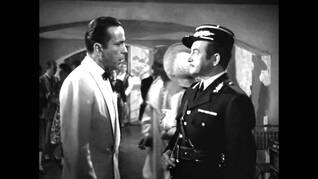 So I was just standing there, shower-shaving and reading yet another story about fans booing those cheating’ Houston Astros when it hit me like a wild pitch: “Seriously…what’s the big deal?” Remember that scene in Casablanca when Capt. Renault (Claude Rains), forced by the Nazis to drum up an excuse to close Rick’s? He loudly announces: “I shocked - SHOCKED! - to find that gambling is going on in here!”…just as Emil the croupier (Marcel Dalio) walks up and hands Capt. Renault his winnings from that evening. This feels kinda’ the same to me. I’ve been a baseball fan since early in my youth, when I graduated from Wiffle ball in my pal Dino’s backyard to playing 2nd base as a 10-year-old for a scrub team called the Dodgers - which gave rise to my first favorite MLB player, L.A. Dodgers 2nd baseman Davey Lopes. Later, it was church and media beer leagues, along with youth baseball and softball coaching as our kids came of age. Pretty standard-issue American baseball fandom track. Wasn’t very good as a player, maybe fair as a coach…but sufficient to earn my American baseball man card. Throughout that time as player, coach, and fan, the truth is that cheating has been as much a part of the game as Texas Leaguers and drag bunts - particularly baseball of the professional variety - and long before television’s center field camera opened up the sacrosanct, sign-giving world of the catcher’s crotch. From 1800s gambling scandals and Ty Cobb taking out opponents with sharpened cleats to modern day corked bats, baseball doctoring and steroid-enhanced sluggers, the reality of cheating in baseball is as old as the infield dirt As Hall of Famer Tony Gwynn once said, “A baseball purist will tell you that it’s only cheating if you get caught.” While I can say with a straight face that I never even thought to try to steal a sign from another team (I undoubtedly wouldn’t have been very good at it) - I witnessed youth coaches (especially travel team coaches) who did so regularly and unashamedly. Seems it’s always been a part of the modern game - an accepted ‘Spy vs Spy’ game within a game…and may the better spy win. So what did the Astros do? The reality is that they simply used available technology and out-cheated the other guys. That, and they got caught doing it in the wrong games - namely the playoffs and World Series. It’s been said - and rightly so - that character is what you do when no one is looking. I’ve played tennis most of my life, and in my experience, at least, the difference between that sport and baseball is stark when it comes to honesty and character. Sure, being that humans are involved, it isn’t 100%, but weekend hackers like myself call our own lines and most are honest to a fault (tennis pun intended.) Golfers can generally claim the same respect for the rules - and for their opponents. Not so, MLB. Sadly, early on, cheating became ‘acceptable,’ inevitably followed by ‘expected’ and ‘essential.’ The form changes with the times, but not the base intent - to gain any edge possible by any means possible, because winning is what it’s all about. “If you ain’t cheatin’, you ain’t tryin’ ,” some cheater once said. What it all means is hard to say, of course. To me, though, honesty, character and integrity are still infinitely more valuable that a ‘W’; even a World Series ‘W.’ Whatever your feelings on the matter, the outrage seems a bit dubious. After all, history clearly shows that baseball and cheating go together like America and apple pie.  Haven’t penned anything in a while, in part because A) sadly, no one is paying me to do so and B) because I’ve just been too darned busy. And part of that busyness was my part-time seasonal job at Lowe’s. I spent parts of about four months there, and - maybe it’s just the pesticide exposure talkin’ - but I thought it’d be fun to share a few observations from inside the Big Box. This was my first legit foray into the wide world of retail, unless my first job as a paper boy counts. However, apart from the common thread of working in the Great Outdoors, this was decades - and worlds - apart from that. My baptism into the Cult of the Red Vest was by fire, or, more accurately, by rock, dirt and mulch. They started me as a “loader,” which, as the name implies, is mostly about loading numerous large heavy items into the back of Penelope’s Escalade whilst she sits comfortably ensconced inside, sipping her Starbucks Double Mocha Latte Praline Supreme. Now loading is a fine job, IF one happens to be A) young B) strong C) non-arthritic. Unfortunately, being D) none of the above, no one has been this mis-cast since John Wayne played Genghis Kahn. First came the brief job interview, highlighted by a drug test whereby you stick into your mouth a swab that bears an unsettling resemblance to one of those in-home pregnancy tests, the idea being you have to slobber onto it sufficiently to turn the test strip a certain color. Well, salivate and drool as I might - and those are skills which it turns out are hard to summon on demand - I couldn’t get that strip to turn color for nothin’. I contemplated asking the HR guy to at least place a photo of steak, lobster tails or the SI Swimsuit Issue in front of me to jumpstart my snoozing salivary glands into action, but that seemed a bit much. I then briefly considered sneaking an appropriately-colored Sharpie from his desk when he wasn’t looking and coloring the strip myself, but who knows what sorts of things they would’ve decided I had in my system after analyzing that. So I sat there for an interminable 15 minutes or so until, mercifully, the dang thing gave just enough of a hint of tint to make him happy and allow me to yank that oversized Q-Tip out of my mouth, thank you very much. Spit test passed, it was on to the ubiquitous corporate indoctrination proceedings, courtesy of a protracted session on a training room PC, featuring the company CEO, Marvin Ellison. I’m sure he’s a nice dude in person, but listening to him drone on ad nauseum in corporate speak was right up there with sweeping out the fertilizer aisle - two topics that actually have a disturbing amount in common. There are also plenty of marginally more useful videos to wade through, such as what to do if you see someone shoplifting (answer: pretty much nothing) or trying to shoot up the store (answer: pretty much RUN!) When I finally started working there, the weather was still trending cool and wet, which gets mighty old, mighty fast, in the garden center. One learns quickly to not wear anything you care one whit about, so please have some empathy for the loaders of this world when it comes to their seeming lack of fashion sense. Trust me - It’s all about staying dry and warm or dry & cool, depending on the day. As the weeks began to wear on, the heat & humidity ramped up and my 50-something body wilted like week-old lettuce under a heat lamp. I really worked hard to try to keep up with the young guys who more typically wind up in these jobs, but there comes a time - and they seem to come a lot more often to me these days - when you just have to admit to yourself that you can’t keep doing something just because you used to be able to do it. Thus it was that I then became a “waterer.” Give Lowe’s credit for this much: Their job titles are easy to understand. Loaders load, waterers water. Now watering plants sounds like a tolerable - even pleasant - activity, especially on a nice day. But this isn’t Aunt Bee out back by the picket fence with her trusty, rusty watering can, whispering sweet nothings to her hydrangeas as she showers them with love and liquid. At Lowe’s, watering is a structured industrial process bent on maintaining an inventory of literally thousands of pieces of living merchandise worth many more thousands of dollars. While I was indeed thankful to be relieved from the mounting aches & pains of the loader life, Water World - The Lowe’s Edition comes with its own set of challenges, not the least of which is the mind-numbing boredom inherent in methodically watering row after row, table after table, rack after rack, day after day, of everything from packs or teeny ground cover plants to dozens of large, thirsty trees. Some folks are wired better than others for dealing with that level of monotony, and while I admittedly wasn’t built to be a middle-age beast of burden, the pain & suffering of loading made grappling with tedium seem almost pleasurable by comparison - kind of like being transferred from Attica to the Mayberry jail. (I will, however, hasten to add that holding a hose for literally hours at a time - often over your head to get all of those hanging plants - is pretty darned tiring, too.) The repetitive nature of keeping nature hydrated demands coping mechanisms to keep from becoming a blooming idiot, as it were. From counting plants and people watching to sneaking a peek at my smartphone whenever the opportunity presented itself, you do whatever you have to do. I also learned more about plant varieties, hardiness, sunlight and watering requirements and other botanical trivia than I ever thought possible. As I got more comfortable with all things lawn & garden, I also pleasantly surprised myself by gradually becoming quite comfortable with customer service. I’ve never been the most outgoing guy in the room, but it’s actually pretty fun to be able to help people out. Apparently, somebody along the corporate ladder between me (lowest possible rung) and Marvin Ellison (highest, gold-plated rung) thought just enough of my efforts to finally award me my own Red Vest. One fine day, at the morning meeting in the kitchen & bath department, myself and my buddy and fellow waterer Glen, an affable 70-something multiple stroke survivor, were presented with our vests and feted with the requisite awkward five seconds of mandated group applause. Awkward for we recipients, too, but also a relief to have been officially welcomed, however perfunctorily, into the clan. I guess this is true of all such groups, but Lowe’s had its interesting cast of characters. There was my direct supervisor, for example - a sweet gal who also drove a forklift like a Mad Max character. Of course, for everyone else, perhaps I was part of their cast of workplace characters - the quiet older guy with the floppy Tilley hat, I reckon. The Outdoor Lawn And Garden crew was its own little group. The only time I really spent any time with non-OLAG co-workers was in the break room. During a full day, you got two 15-minute respites there, plus an hour lunch in the locale of your choosing. Pretty standard fare there - lockers, vending machines, one large table and - I spent a lot of break time here when I was a weary loader - one of those anti-gravity chairs. It took all of the personal responsibility I could muster to not fall asleep in that chair twice a day. There was also a TV which only seemed to receive A) crime shows and B) old westerns. I developed a bit of an affinity for classic cowboy movies in my time there - at least as much as you can when only catching 15-minute snippets of Grit TV reruns. Alas, summer came to its inevitable end, and so did my part-time seasonal job at Lowe’s. Even though my trunk has a fair amount of rings at this point, I’d like to think that, like the plants I spent so much time watering, I managed to thrive and grow while I was there. 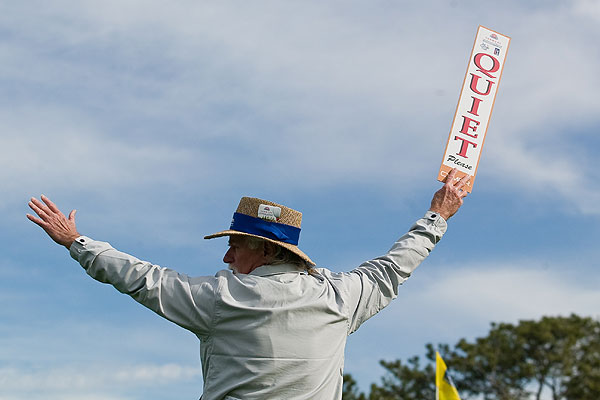 In the early 1970s, there was a quirky song — more talking than singing, really -— called “Desiderata,” which, only now have I come to learn, is Latin for “desired things.” It was the title track from a vinyl LP which won the 1972 Grammy for ‘Best Spoken Word Album.” It was recorded by a fascinating fellow by the name of Les Crane, who is worthy of a story all by himself. Groundbreaking radio & TV host, jet fighter pilot and he even lived out the fantasy of many a 1960’s boy like myself by marrying “Ginger” (Tina Louise) from “Gilligan’s Island.” Yes, Les had more than most. Anyway, the words to “Desiderata,” which a college professor introduced me to in the late ‘70s, were penned by American writer Max Ehrmann in 1927, but lay in literary obscurity until Crane popularized it with his ethereal voice. An idealistic manifesto for a happy life, one of its more memorable sentiments goes like this: “Go placidly amid the noise and haste…And remember what peace there may be, in silence…” I suspect that was a lot easier to do in 1927. Sure feels that way, anyway. Considering the chaotic, confrontational cacophony of the last several months, which shows no sign of relenting, I’ve been lately contemplating the ever more elusive concept of peace and quiet. Think about how often you’re in a truly quiet place these days. I’m talking quiet enough to hear your own heartbeat…to hear the background noise of your own auditory system. The kind of silence that is, in its way, a bit overwhelming to the denizens of a world now known for noise. When’s the last time you sat in a truly quiet place, contemplating your own mortality? It can be a daunting, but worthwhile experience. Our very lives are something we all take for granted most of the time. No matter your station in life, your wealth, your power and popularity, all of that will last only so long as that fist-sized miracle of design and durability keeps mystically pumping away inside your chest. Humbling. Max Ehrmann knew what he was talking about. Silent reflection is a healthy, even vital, human experience. Focusing on our tenuous hold on this temporary earthly life, is, in my estimation, crucial to keeping one’s priorities in order and to best enjoying the gift that is your life. Contemplating the seemingly infinite and impossibly complex balance found within us, and all around us, defies any reasonable explanation, save that of God’s handiwork. Sorry, Bill Nye, but minds far greater than yours have tried to explain all of that away to chance and evolution. I personally can’t muster the ridiculous level of faith required to jump into that implausible primordial soup. Maybe he just needs more silent contemplation in his life. I know I do. I’m not against all noise, mind you. For example, I was recently privileged to hear the Buffalo Philharmonic Orchestra perform “An American in Paris.” George Gershwin knew how to make some very good noise. But, by and large, the day-to-day sea of incessant sound in which we swim is an eroding force, washing away our inner peace in thunderous, unrelenting waves of overstimulation. One has to be much more intentional about seeking the essential solitude of silence, but I maintain that it’s a goal worthy of pursuit. So remember: The most important button your TV, your radio, your computer and your phone…will always be the “off” button. Like the sign says….”Quiet. Please.” |
Mark WebsterSome seriously whimsical and whimsically serious thoughts on this, that & the other thing... Archives
January 2021
Categories |
Proudly powered by Weebly



 RSS Feed
RSS Feed